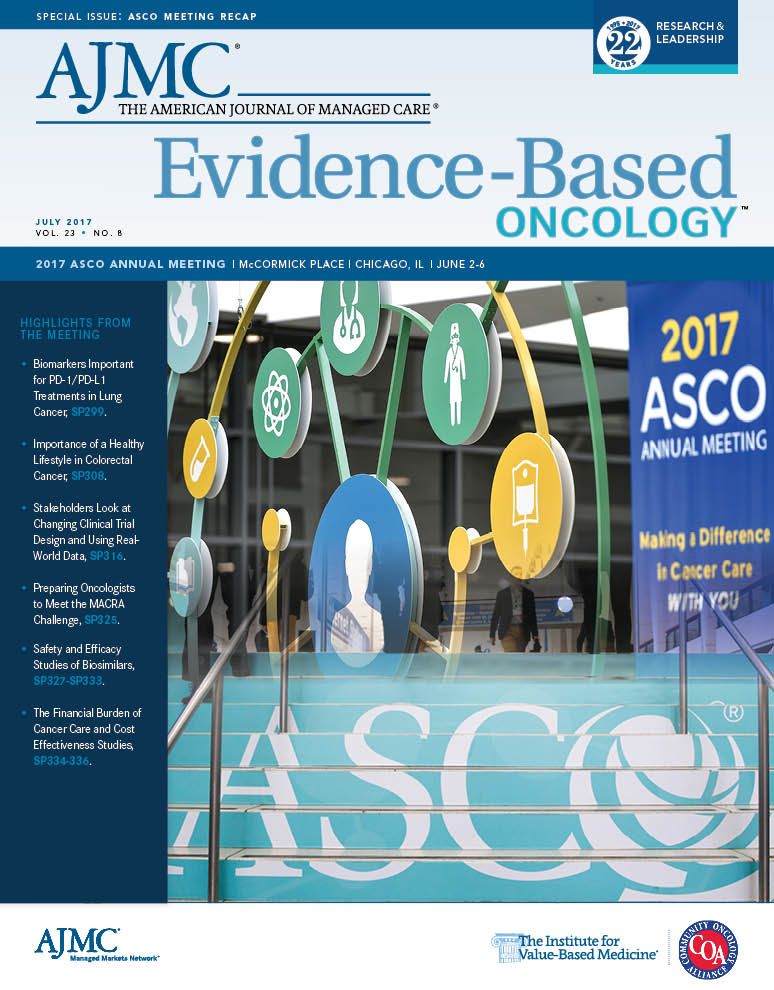- Center on Health Equity & Access
- Clinical
- Health Care Cost
- Health Care Delivery
- Insurance
- Policy
- Technology
- Value-Based Care
An Early Stage Safety, Efficacy Study for Atezolizumab Plus Daratumumab in Advanced NSCLC
An early stage international clinical trial is actively enrolling patients with relapsed, advanced or metastatic non—small cell lung cancer (NSCLC) to evaluate response to a combination of atezolizumab and daratumumab, according to a study at the 2017 Annual Meeting of the American Society of Clinical Oncology that detailed the trial design.
AN EARLY STAGE INTERNATIONAL
clinical trial is actively enrolling patients with relapsed, advanced or metastatic non—small cell lung cancer (NSCLC) to evaluate response to a combination of atezolizumab, the programmed death-ligand 1 (PD-L1) inhibitor, and daratumumab, an anti-CD38 antibody. A study at the 2017 Annual Meeting of the American Society of Clinical Oncology detailed the trial design for the phase 1b/2 study.1
Daratumumab is approved for the treatment of relapsed/refractory multiple myeloma (RRMM).2 The therapy produces deep clinical responses in RRMM and induces T-cell expansion through reduction of immune suppressive cells. Atezolizumab was approved last year for metastatic NSCLC that failed to respond to platinum-based therapy,3 following a review of data from the OAK and POPLAR trials.
With the current study, the authors hypothesize that a combination of daratumumab and atezolizumab may improve clinical responses in previously-treated patients with NSCLC by enhancing anti-tumor T-cell responses facilitated by checkpoint inhibition. The early stage study has been designed to assess the anti-tumor activity and safety profile of the combination compared with atezolizumab alone in the above patient population.
Patient eligibility criteria, in addition to being older than 18 years, having an Eastern Cooperative Oncology Group status ≤1, and stage IIIb or IV advanced NSCLC, include:
- Known PD-L1 status
- No mutations in ALK, EGFR, and ROS1
- No prior treatment with daratumumab or other CD-30 therapies
- No prior treatment with CD137 agonists, immune-checkpoint inhibitors, and anti—PD-L1 therapies
- No active or untreated metastases to the central nervous system
The run-in safety cohort of 6 patients will receive 1200-mg intravenous (IV) atezolizumab in combination with 16-mg/kg IV daratumumab. The trial will be expanded to include 90 patients (randomly assigned to the 2 arms) if less than 2 patients experience dose-limiting toxicity. The atezolizumab arm will receive the drug on day 1 of every 21-day cycle; the combination arm will receive atezolizumab on day 2 of cycle 1 and day 1 of every 21-day cycle after that, along with daratumumab once weekly for cycles 1 to 3 and on day 1 of every 21-day cycle thereafter. Crossover is allowed if patients progress.
The primary endpoint is overall response rate. Secondary outcomes include safety, duration of response, clinical benefit rate (≥16 weeks duration), progression-free survival, overall survival, and pharmacokinetics and immunogenicity of the daratumumab-atezolizumab combination.REFERENCES
1. Pillai RN, Ramalingam SS, Carbone DP, et al. Randomized, open-label phase Ib/II study of atezolizumab with or without daratumumab in previously treated advanced or metastatic non-small cell lung cancer (NSCLC). J Clin Oncol. 2017;35(suppl; abst TPS9102).
2. Dangi-Garimella S. Breakthrough for daratumumab for use as second-line treatment with standard of care in multiple myeloma. The American Journal of Managed Care® website. ajmc.com/journals/evidence-based-oncology/2016/august-2016/breakthrough-for-daratumumab-for-use-as-second-line-treatment-with-standard-of-care-inmultiple- myeloma. Published August 19, 2016. Accessed June 26, 2017.
3. Dangi-Garimella S. First PD-L1 inhibitor approved as second-line treatment for NSCLC. The American Journal of Managed Care® website. ajmc.com/newsroom/first-pd-l1-inhibitor-approved-as-second-line-treatment-for-nsclc. Published October 19, 2016. Accessed June 26, 2017.


